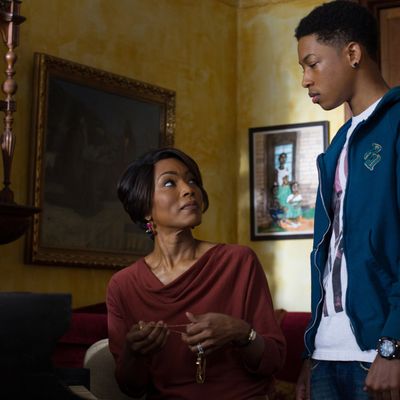
“I heard that when a woman bestows a name on her child, it reveals her hope,” says the lead character of Black Nativity, whose name, perhaps understandably, is Langston — as in the essential poet and playwright of the Harlem Renaissance, upon whose all-black 1961 musical restaging of the Nativity this film is based. Living in inner-city Baltimore with his single mom Naima (Jennifer Hudson), Langston (Jacob Latimore) may not be planning on becoming an acclaimed poet anytime soon, but he does have a florid way of speaking. “I used to envy happy families on the street,” he remarks. “After a while, I chose not to see. Unanswered prayers made you weaker.” Black Nativity is full of loaded dialogue like this — some of it spoken, much of it sung — but it unfolds in an atmosphere of such relentless anguish that the words’ portent rings true.
The film’s writer-director Kasi Lemmons displayed a genuine feel for the poetry of despair in earlier, ornate films like Eve’s Bayou and The Caveman’s Valentine. And for all its celebratory, pageantlike qualities, Black Nativity is no different. It’s not so much a movie about Jesus as it is a movie about why one might need Jesus, or religion, in the first place; it rightly places the focus on those who seek spiritual salvation. It doesn’t always work as drama, but as a musical, it’s often fantastic.
Hughes’s Nativity pageant has been regularly performed in black churches and other venues around the country since the sixties. Lemmons’s film incorporates the Nativity in its second act, where it’s staged in a Harlem church on Christmas Eve, but its chief focus is young Langston’s arrival in New York after he and his mom are evicted from their house. Though she hasn’t spoken to her own parents in years, Naima sends her son to live with them in their elegant Harlem brownstone. Grandpa, Reverend Cornell Cobbs (Forest Whitaker, great as always), is a proud and beloved member of the community who as a youth got to preach at Martin Luther King’s church, and he makes a point of trying to teach his young grandson about black history. “Your namesake Langston once said he’d rather be a lamppost in Harlem than the Governor of Georgia,” he tells the boy. The young man, however, isn’t having any of it. “It’s like a museum up here,” he says, surveying grandpa’s study. “A black people museum.”
Cultural history, however, takes a backseat to family history when it comes to the film’s musical scenes, which bridge time and space: A boy who misses his mom gets to commune and duet with her onscreen; a Bethlehem manger winds up in the middle of Times Square, and a pregnant homeless teen (Grace Gibson) comes to represent both the Virgin Mary and Langston’s own mother in her youth; Mary J. Blige shows up as a platinum-haired angel; Nas shows up as a street corner Isaiah. The music runs the range from gospel to jazz to hip-hop, and the numbers reflect the film’s eclecticism. As such, not all of these scenes work: There’s a particularly weird one featuring Blige that feels like an uninspired attempt to create a music video, with characters mostly standing around and looking awkward while she sings.
Maybe that’s part of the design, too. There’s a theatricality to Black Nativity, particularly in its later scenes, that might be off-putting in an ordinary context. “What kind of parents are you?” Langston asks his grandparents. “We’re the broken-hearted kind,” his grandmother (Angela Bassett) replies, with a bitter smile. Characters proclaim, bluster, and sing in ways that don’t always feel natural. But here, it feels right: Hughes’s play is founded on the very pretext of theatricality, on the changing nature of an audience’s relation to the spectacle unfolding onstage. To try to play that down would be a mistake. Perhaps the most remarkable scene in Lemmons’s film occurs near the end, in the wake of the Nativity, when a big, broad family confrontation plays out sans singing or even incidental music. It’s initially off-putting, but as it unfolds, as the actors hurl accusations at one another and delve into their pasts, and as the congregation begins to respond as if this were the actual service, you start to get into it. The very lack of music begins to feel musical in itself.


